Confronting Eviction in Manjolai: Care, Community and Resistance
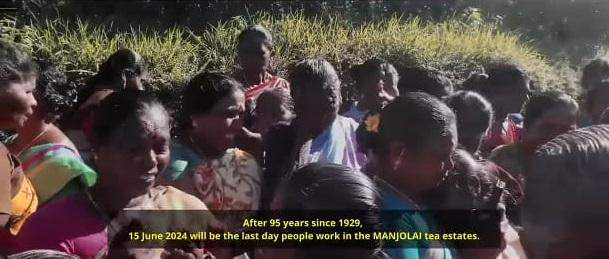
The Vaanam Art Festival is a tribute to centuries of Dalit resilience and lived experience. The festival included the PK Rosy Documentary and Short Film Festival, which screened Samuvel Arputharaj’s Manjolai, the story of tea-garden workers in the hilly terrain of Manjolai in Tamil Nadu’s Tirunelveli district. The first part of this essay explored how the workers are caught in the seesaw of legal rifts between the government’s forest department and the Bombay Burmah Trading Corporation (BBTC) over thousands of acres of monocropped tea plantations leased by the latter. The forest department wishes to revert the plantation into protected forest land, as a result of which the company abruptly surrendered and brought its operations to a grinding halt in 2024 with no thought for the consequences on the lives of the predominantly Dalit workers. The company then forcefully evicted thousands of workers, who were also coerced into agreeing to the company’s Voluntary Retirement Scheme (VRS). While this serves as a reminder of the ability of the powerful to damage the working class, Manjolai’s residents fought the battle till the end. Their history of protests is testament to their refusal to be reduced to powerless spectators.

"The police beat and threw the bodies of those who fought for their rights into the river."
The interlocutors in Arputharaj’s film offer rich histories of strikes and protests in the estate, shedding light on a series of juxtapositions between their lives and those of the powerful. The Wadia group, which owns BBTC, are known in Mumbai’s elite social circles for their elaborate taste and refined sensibilities in food and palate. Yet, in the late 1960s, workers had to strike to demand three idlis for dinner, and the police force was brought in to dismantle the gathering workers. The other protest—Manjolai’s biggest strike so far with fatalities of eighteen people—was in 1998, the same year India completed its nuclear test in Pokhran creating a fantasy that its colonial past was in the past. The strike started out as a humble demand for a wage hike of Rs 50, which the company tried to put off through police intervention. After a lathi (baton) charge, many protesters escaped through the forest areas and resumed their protests in the plains. Seventy-six men were arrested overnight in Oothu, one of the five estates in the hills. With the help of the state, the company paused government buses to Manjolai to keep the protest a secret. But with the intervention of civil society members, bus services resumed within ten days. In the hunger strike by the estate workers, nearly 700 were arrested and imprisoned in Trichy for fifty-four days. But on the fifty-third day, police brutality in Tirunelveli against a group of protesting people led to eighteen people, including a one-year-old baby boy named Vignesh, whose bodies were thrown into the Thamirabharani river after beating them to death. Referring to the fatal incident, interlocutor Stephan Raj says that the postcolonial state and BBTC are worse than the British.
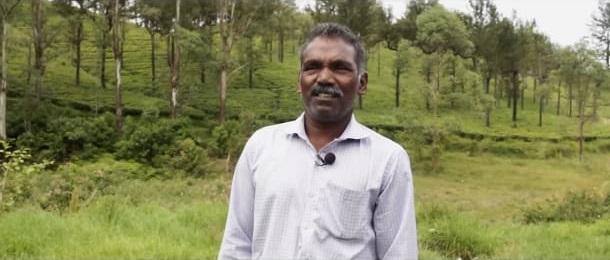
"No one knows what goes on uphill."
Similarly, Manjolai resident Vijaya Kumar, speaking in the southern Tamil Nadu dialect dubbed as “Nellai Tamil”, recalls: “It was for the first time we went to stay with the relatives in the plains for a long time during the strike. We got to see their views about us. We realised our lives are here in the hills, and so we returned.” While the relatives no longer view them as their own kin from the plains, the Madurai bench of the Madras High Court refused to recognise them as hill people. Kumar cuts short there and does not expand on their relatives’ views of them as estate workers.
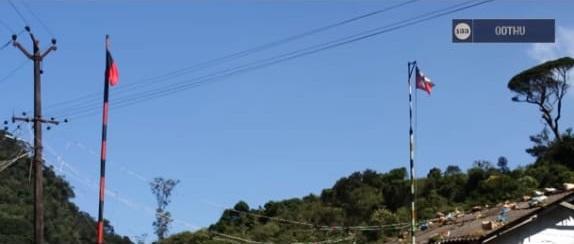
"The company is doing all of this, so what is your job? Why are you taking taxes?"
What he did not explain can be seen in Prasanna Vithanage’s Paradise (2023), set in a Sri Lankan plantation, which shows how the worth of an estate life always floats lighter over anything and anyone else. In Paradise, we see how the police kill a Tamil estate boy randomly in the name of investigation over the theft of a few mobile phones. If Paradise (2023) reveals the fragility of plantation lives and mainstream society’s prejudices against estate labour, then Manjolai speaks of the brutality of India’s caste-ridden society through its depiction of the ways in which Dalit plantation workers are tossed back and forth between the law and greedy estate owners. In both films, the state is either absent or it commits atrocities. Manimaran, an Oothu resident in the Manjolai hills, says, “They made us disown our cattle, and disallowed the growing of vegetable patches too. The cow sheds were razed down and vegetable patches in our kitchen gardens were cleared.” Episodes like these rightly turn people’s anguish towards not their estate owners but the state. John Kennedy, one of the interlocutors in Manjolai asks: “It is the company BBTC which has taken care of everything including the civic amenities for the resident workers here. Then why do we need to pay you (the government) the tax?”
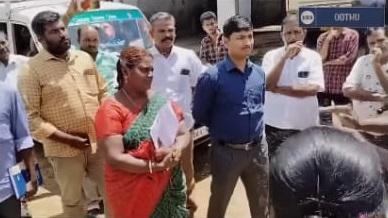
'We let you talk a lot so please hear us out as well."
What is unmissable in Manjolai is the well-informed and straightforward testimonies of its interlocutors. For instance, Manjolai resident Jeyashree recalls the district collector of Tirunelveli asking her, “Do you think we are here to act in the interest of your people? In Manjolai, the absent state is only hiding behind the estate owners. Despite the company's government debt worth thousands of crores, it was with the help of the government’s Tamil Nadu Electricity Board (TNEB) and Public Works Department (PWD) that the BBTC orchestrated a power and water blockade in 2024 to force the workers to leave the hills. This manoeuvre allowed the company to smoothly declare the estates “defunct,” and pushed the remaining residents of Manjolai into a deadlock. Shots of Manjolai interspersed between the various interviews in the film make the estate appear completely deserted. But from the 1930s—when the estates were created—until the 1990s, it was home to thousands of people. Robert Chandrasekar singles this out for us to see: “All our ancestors, their cemeteries, their toil, our places of worship and our people’s history are going to become forests and go into nothingness. It is a complete erasure.”
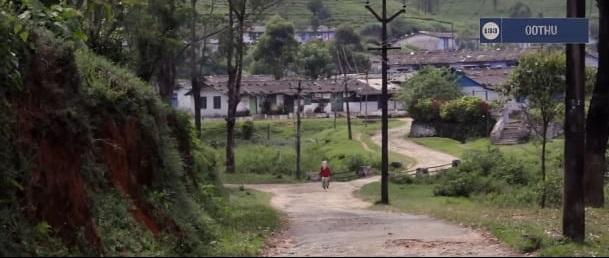
"The situation is hard, there are no restrooms in the plantations."
The film also addresses everyday issues linked to the complex lives of labour. In a sequence midway through the film, a group of women bring up the matter of the absence of access to restrooms, making life hell during their monthly menstrual cycles, and the complete absence of maternity cover. In Gaiutra Bahadur’s Coolie Woman: The Odyssey of Indenture (2013), the concept of Jahaj behen (ship sister) among Indian women indentured labourers in the Caribbean references a person with whom all your psychological burdens are secretly kept. It is only through the mercies of sisterhood, where one cares for the other with concrete forms of material support at required times, that women in harsh conditions such as the plantation are able to survive. One of the women said how they would occasionally cover for other women’s work when they had to take breaks to nurse their newborns. Living a prolonged life is a challenge in itself for coolie women. So, to sustain and pass down life itself is a feat.
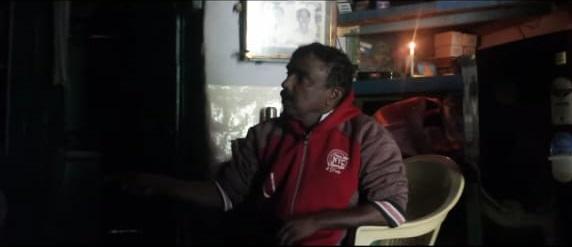
"They should have said they were there for us like they were all these times before."
In another sequence in the film, the interviewer asks the same group of women and one man holding a toddler with its arms clasped around his neck, “Why do you think the labour union did not intervene after a certain point?” At first, a woman responds to this simply, “The company officials would not have allowed them inside.” But the man sitting with the child casually comments that the union could have come if they had intended because they still pay their subscriptions to the union. He goes on to add that in the past, when there were thousands of people here, they had taken the trouble of jumping and climbing over closed gates when there were strikes and sit-ins. But now that the community is outnumbered, the union could not care less.
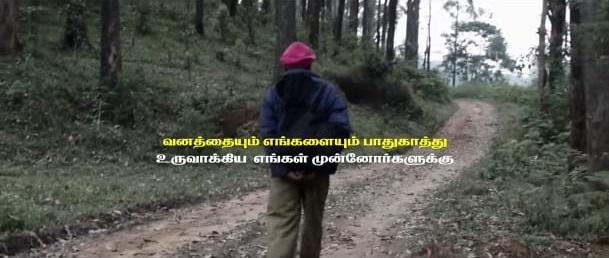
"For our ancestors, who protected the forests and us."
In the next frames, other interlocutors touch the nerve centre of the matter—having lived together in a tight-knit plantation community, they wonder how they are going to face another life. To this unanswerable question, perhaps some meaning may be sought in Sujatha Gidla’s Ants Among Elephants (2017). The author’s family history begins with her forest-dwelling maternal great-grandparents' lives being disrupted by the felling of forests in present-day Andhra Pradesh. Left homeless for the first time, and not accustomed to hierarchy and private ownership of land, they were introduced to the unjust feudal caste order of agrarian society which labelled them “untouchable.” Now, in Manjolai, as the government is reversing the felled forest by proposing afforestation, people are asking the same question: “How are we going to face an unequal life?
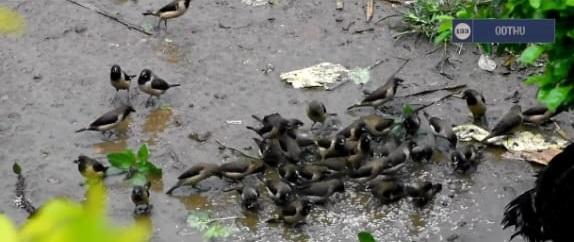
"We came so far to lose at the last moment."
In case you missed the first part of the essay, you can read it here.
To learn more about the Vaanam Art Festival, read Steevez’s essay on MKP Gridaran’s Dalit Subbaiah (2025).
To learn more about Prasanna Vithanage’s Paradise (2023), read Sucheta Chakraborty’s essay on the film.
All images are stills from Manjolai (2024) by Samuvel Arputharaj. Images courtesy of the director. All captions are testimonies from the film.




